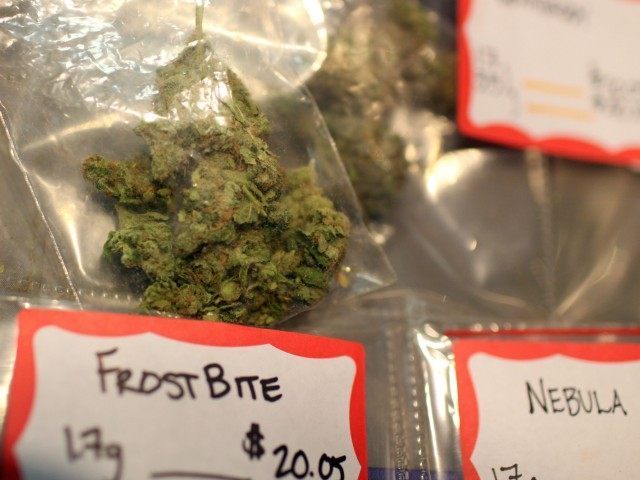With Sacramento politicians desperate to find a new source of continuous tax revenue, the state’s Blue Ribbon Commission on Marijuana Policy has just published a study, “Pathways Report Policy Options for Regulating Marijuana In California,” as a precursor to sponsoring a 2016 ballot initiative to legalize recreational pot use.
However, it seems that underground farmers of California’s largest cash crop have no intention of going legit and paying taxes.
“One of the major findings of the Blue Ribbon Commission’s work is that the legalization of marijuana would not be an event that happens in one election. Rather, it would be a process that unfolds over many years requiring sustained attention to implementation,” the report says.
In perhaps the most hilarious section of the report, under the heading “What to do with all that new tax money,” the Lt. Governor Gavin Newsom-led group of academic and law enforcement experts suggests that the expected cash hoard from taxing marijuana should not go to back-fill the State General Fund: “We do not believe that making government dependent on cannabis taxes makes for sound public policy, nor do we believe cannabis tax revenue will be very large in relation to the total budgets of state and local government.”
Sacramento politicians have been clear that they hope marijuana can provide a stable tax revenue base for the perpetually insolvent state. After passing Proposition 30‘s“temporary tax increase” in 2012, the Golden State saw its top marginal tax rate jump by 33% and capital gains taxed at the same rates as income, up to 13.3 percent.
The media have been full of stories about companies moving to lower-taxed states, but tax collection was up by $11 billion in the 2015 fiscal year, mostly due to huge capital gains taxes from Silicon Valley. California’s collection of capital gains jumped from $4.7 billion in 2010 to 11.9 billion in 2014, and may have hit $15 billion for 2015.
Yet with the annual cost for state employees’ salaries and benefits at $10 billion, any fall in capital gains collections would create the same type of disaster for public employee unions that happened in the Great Recession, when capital gains income to the state plunged from $10.9 billion in 2007 to $2.3 billion in 2009. In that crash, 6.7 percent of the state’s public employees were terminated; K-12 and early education were slashed by 8 percent; and public health and welfare were slashed.
The 93-page Blue Ribbon Commission on Marijuana Policy report makes 58 recommendations essentially suggesting that marijuana “licensing” should shadow the policies used to maximize tax collection in regulating alcohol distribution and consumption in California.
Licensed and taxed entities would include: cultivators who grow cannabis; distributors and wholesalers; manufacturers who make specific products for retail sale; retailers who sell to individuals; transporters who are responsible for delivery between any two points in the system; suppliers of seeds; product testing; training providers and any other entities involved in supply chain monitoring; and product safety testers.
Separating alcohol manufacturing, transportation and distribution has been the key to maximizing tax collection in the U.S.. The weight and size of alcohol liquids make them much easier to identify in illegal transit and storage.
But the bad news for tax-hungry Sacramento politicians is that the current drug business is highly integrated with criminal gangs controlling all levels of production, transportation and distribution. Recognizing that the only way to bring the illegal pot trade into regulation, the Newsom report suggests that marijuana regulation would have to allow a higher level of integration than alcohol:
Alcohol regulation clearly separates manufacturer, distributor and retailer, with few exceptions. Prohibiting all vertical integration would have the effect of breaking up some current responsible players in the medical marijuana industry who engage in cultivation and sales, while requiring vertical integration of cultivation and sales could force large numbers of small incumbent growers into rushed and perhaps unwanted “shotgun marriages” with retailers.
The report also seems to suggest concessions to labor unions as a way to add political support: “The workforce involved in marijuana cultivation and processing should be afforded the same protections and rights as other workers in the agriculture and processing industries. This includes the right to collective bargaining, as well as other worker safety protections.”
As Breitbart News recently noted, in “California Is Greece, but with Capital Gains,” the state’s failed experiment in liberalism has resulted in the highest poverty rate in the U.S. at 23.4 percent. The grossly insolvent Gold State, with about $500 billion in debt, has survived–on life support–from billions of dollars of inconsistent revenue from capital gains taxes.
Desperate to keep the game going, Sacramento politicians are pushing to legalize marijuana for the tax revenue. They are likely to be disappointed.

COMMENTS
Please let us know if you're having issues with commenting.